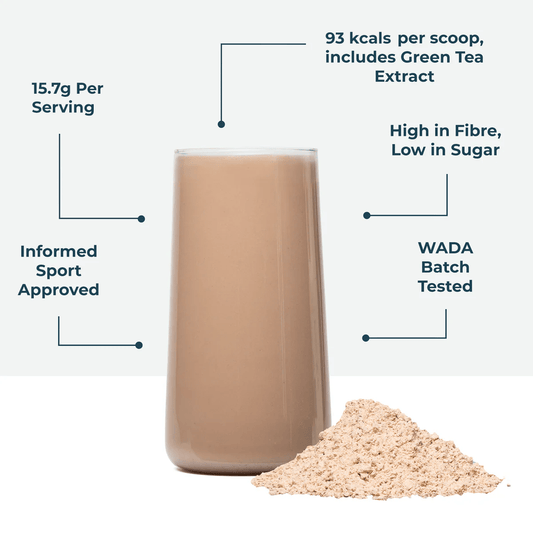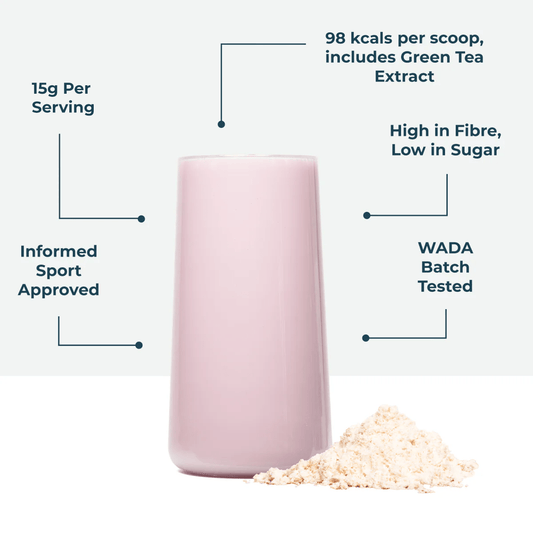Everything You Need to Know About Diet Protein

Everyone has a different reason for exercising. So, it makes sense for there to be different supplements to support your individual training goals. For example, if you’re bulking up, you might want to consider mass gainer; whereas if you’re getting back after injury you’ll want to explore recovery supplements.
If weight management and muscle growth is something you’re interested in, then you might want to consider choosing a low calorie protein powder to help your muscles get the nutrients they need whilst still sticking to a diet plan.
If this is something you’re interested in, we’re here to help.In this guide, you can find everything you need to know about diet protein and how to choose the best protein powders for weight loss.
Keep reading to learn more…
What is diet protein powder?
Diet protein powders can be immensely valuable for your training – but what are they? By definition, for a supplement to be called diet protein, it should:
- Have fewer calories than a regular protein powder.
- Include additional ingredients that support weight management.
- Be lower in fats/sugars, and sometimes higher in fibre.
This allows diet protein powders to provide you the protein your body needs to build muscle without the higher carb or calorie content. Protein also helps you feel fuller for longer, which may help to reduce any post-prandial snacking that could impact your diet plan.
If you’re interested in learning more about this, check out our article on What’s the Difference Between Whey Protein & Lean Protein Powder?
What are the benefits of low calorie protein powder?
Whether you’re a pro athlete, or a weekend warrior, if you’re going to include a dietary supplement into your meal and exercise programme, it needs to benefit you. Low calorie protein powders have several beneficial qualities that could suit your style of exercise and training requirements.
Support weight management
The first, and most obvious, benefit of a low calorie protein powder is that it can support weight loss or weight management. But how? To understand that, let’s have a little look at ideas around weight loss.
There are a lot of complex factors that can affect how people lose weight. Body composition, diet, activity levels, metabolism, health status, and even genetics will all influence how your body stores fat, and burns it. But, in general, to maintain healthy weight loss, people can:
- Maintain a safe calorie deficit: this means ingesting fewer calories than you use in a day to encourage your body to use stored sources of fat to generate energy.
- Eat a balanced diet: a varied but balanced diet ensures your body still receives the vital nutrients it needs to function healthily. Reducing fats and sugars, and including more fibre and protein can help you feel fuller for longer and reduce snacking/cravings.
- Exercise regularly: exercise encourages the body to burn more stored energy and can help you with weight maintenance – plus it’s good for your overall health.
Adding a low calorie protein powder then, helps you to get the protein you need from a less calorific source – helping you stick to your intake goals, and supplementing existing nutrition from your diet.
The best protein powders for supporting weight loss (like our very own Lean Active Diet Protein collection) are also usually enhanced by additional ingredients that have been shown to have a positive effect on weight loss. These include:
Green tea extract
Green tea has been heavily studied with regards to its impact on weight loss and obesity. Several studies have shown that it has the potential to support a reduction in body fat percentage1. Research suggests that this may be due to catechins (a type of polyphenol, or plant chemical), which have been seen to affect appetite regulation, lipid metabolism, oxidation and energy expenditure2.
Green tea has also been seen to have a positive effect on low density lipoproteins, or LDL, cholesterol3, reducing the amount of this in the body. Decreasing the amount of this cholesterol in your body helps to keep your heart and circulatory system healthy – and contributes to your overall health and wellbeing.
L-Carnitine
Carnitine is an amino acid derivative that plays an essential role in ATP (adenosine triphosphate) production – which is essential for energy. Your body uses carnitine to “help transport long-chain fatty acids into the mitochondria [of a cell] so that they can be oxidised to produce energy”4.
According to research, l-carnitine supplementation has been shown to “have a modest reducing effect on body weight, BMI and fat mass, especially amongst adults with overweight/obesity”5. As such, it can be a valuable ingredient in protein powders for weight loss.
Conjugated linoleic acid
Linoleic acid is a type of omega-6, and is one of the essential polyunsaturated fatty acids (PUFAs) your body needs to function. As this is not made endogenously, all of your recommended linoleic acid has to come from external sources in your diet6.
Current research is still on-going, but there are positive findings that suggest conjugated linoleic acid may potentially decrease body fat mass and body fat percentage7.
Want to learn more about this topic? Check out our guide to Do Protein Shakes Help With Weight Loss?
Buy Now – Lean Active Protein
Improve lean muscle mass
As a protein powder, even if it is lower in calories, diet protein is ideal to support and improve your lean muscle mass. There is a wealth of evidence that suggests protein supplementation is a useful tool to gain muscle (when in combination with a strength/resistance-based workout routine).
Interestingly, gaining lean muscle mass with a diet protein powder may help with weight management. Having a higher body muscle percentage can help you burn more calories at rest. This is because muscle mass has a more “statistically important” impact on resting metabolic rate8 (often called your basal metabolic rate). Or, to put it simply, muscle tissues use up more energy just existing – so improving your lean muscle mass can help you burn more calories overall.
Increased convenience
There are a lot of mental considerations when it comes to weight loss, and sometimes, having an easier option can make it much more manageable. Including a low calorie protein powder into your daily routine supports your goals, and can be a more convenient option to hitting your protein requirements with food alone.
Making up a protein drink is quick, easy, and tasty! Plus, here you know the nutritional value of your drink, and it can help to reduce cravings and the temptation to snack. As we mentioned above, protein is satiating – and the addition of fibre increases the feeling of fullness.
How to choose the best low calorie protein powders
Knowing that there are several benefits to low calorie protein powders, especially if you’re looking for a protein powder for weight loss support, it’s time to look at how to choose the best one for your needs.
If you’re going to add a supplement to your diet, you want it to be high-quality; so you should look out for the following:
- Ingredient blend: make sure any protein powder for weight loss actively has ingredients in it to support your goals. For example, a high quality diet protein powder will have additional ingredients like green tea extract and linoleic acid (like we mentioned above).
- Protein content: even though a diet protein has fewer calories, a high-quality option will have a high protein content to help you achieve your sporting or exercise goals. At Kinetica Sports for example, our Lean Active Diet Protein, here in a delicious wild raspberry flavour, contains 15g of protein at only 98 calories per scoop. Since it’s also high in fibre and low in sugar, this is a fantastic protein powder for weight loss (and muscle gain).
- Calorie content: obviously, a diet protein powder should have fewer calories per scoop than a regular supplement. But, make sure that the calorie reduction doesn’t come at the cost of a high sugar content! Our Lean Active Diet Protein for example, is lower in fat and sugar than our regular Whey Protein Powder.
- Certifications: while you should expect your low calorie protein powder to be high-quality, you should always look for proof. At Kinetica Sports, we understand this need for evidence, which is why all of our products are tested to comply with strict WADA, Informed Sport, and EFSA regulations.
You know WHY, let Kinetica Sports be your HOW
Consistency is key when it comes to weight loss or weight management. By making sure you can stick to your plan, with a low calorie protein powder that works with your diet, you can continue to see positive results from your workouts.
We have a superb collection of other supplements to help you make the most of your fitness training and achieve your goals. Find everything from Energy Supplements to Electrolyte Drinks right here at Kinetica Sports.
Or, for more information about workout supplements, why don’t you check out the Kinetica Sports blog? We think you’ll like… The Ultimate Guide to Pre-Workout Supplements | A Practical Guide to Choosing Collagen Products | Omega-3: What is it and How Can it Help You?
Disclaimer: this article is not intended as medical advice. Before embarking on a weight loss or weight management programme, or making any changes to your diet, consult a medical professional for more information.








